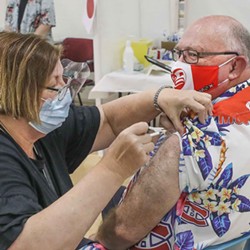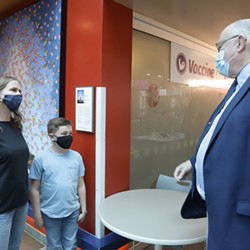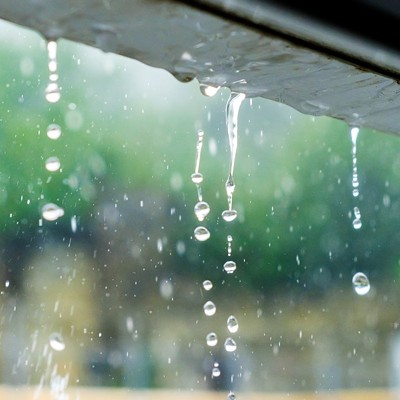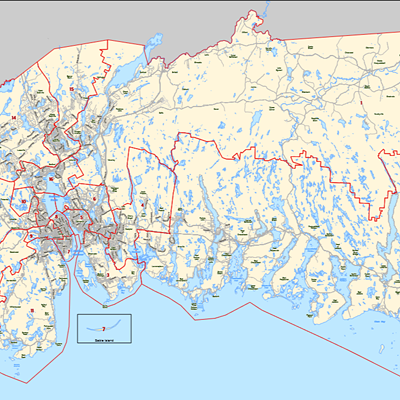According to the province’s count, we are currently in the seventh wave of COVID infections. The first started March 1, 2020, with the earliest known cases in Nova Scotia announced March 15. The pandemic’s omicron era arrived in Nova Scotia on December 8, 2021, making Thursday the first omicronniversary. It’s been a year marked by unprecedented numbers of cases and deaths in the province, but also by the government loosening and then completely doing away with COVID rules, restrictions and mandates. For Dr. Robert Strang, Nova Scotia’s beloved chief medical officer of health, it was the year we could start to picture the end of the pandemic.
“I kind of divide the pandemic into three years,” Strang tells The Coast in a phone interview Thursday. “2020 was the year of what I call the unknown.” Humanity was suddenly under attack from a virus nobody on the planet had faced before, an alien invader that might as well have come from Mars as Wuhan. “There was so much we didn't know, and so many very severe potential consequences,” Strang says, “we had to react very strongly.” People and governments tried everything: Lockdowns, quarantines, washing groceries, limiting hospital use, closing borders, mandating masks.
“Year two was really the year of vaccination,” says Strang. “Our goal was to build as high as possible levels of immunity from the vaccine. In Nova Scotia, we did a good job of that.” The vaccine, designed and deployed in record time, was a massive breakthrough. We also learned more about treating the disease to make it less deadly, and natural immunity was increasing as more people caught COVID throughout 2021.
Plus the virus itself was mutating. Remember when the delta variant was the next big threat? Of course you don’t! Because omicron came along.
After the year of the unknown and the year of vaccination, we could have expected a year when COVID’s pandemic phase ended, and it turned into an endemic problem that we live with, like the flu. But the omicron variant arrived, easily evaded the early vaccines and swept the planet, dragging things out.
“We're still in this very long transition from the acute pandemic to ultimately being endemic,” Strang says. “What omicron has done has prolonged that, since the vaccines we have had, up until very recently, were only moderately effective against preventing transmission of the omicron strains. They still remain very effective against preventing severe disease. And that's been critically important. But what it meant is we had to accept that there was going to be lots of transmission of these omicron strains. Because even with vaccine, they're highly infectious, and they can spread easily.
“We will get to, ultimately, a true endemic state. But omicron has been throwing us some curveballs.”
That said, Strang is optimistic about what the next year of COVID will bring. “I never say never,” he cautions, but: “What we’re seeing is low and slow and stable, even starting to, you know, creep downwards or continuing to slowly trend over time downwards.” Although lots of new omicron variants have been identified, “none of them have really shown any significant change or any major different potential.”
The weekly COVID stats the province releases—the numbers of new infections, hospital admissions and deaths—will have some ups and downs that might raise short-term concerns of surges or outbreaks. The longer trend, however, which public health assesses from a variety of sources on top of COVID testing, including waste water surveillance and monitoring communities that have been outbreak-prone in the past, is towards endemic COVID.
Will Strang venture a guess when that’ll happen? He will.
“I think in all likelihood, we're going to get to a place in 2023 where we can say, yeah, the pandemic is over.”
How flu became the problem
Endemic COVID doesn't mean the end of COVID. “Even if we officially say the pandemic is over it doesn't mean that the COVID virus is going to be gone,” Strang says. “It'll just be circulating, quite likely on a seasonal basis.”
A particularly relevant example from medical history is Spanish influenza. In its acute stage, this “mother of all pandemics” killed more than 50 million people around the planet in two years. That was almost exactly 100 years ago, and we’ve been dealing with endemic flu ever since.
People in public health tend to be more tuned into the dangers of flu than the rest of us. Some flu seasons aren’t a big deal at all, others are deadly. The virus can mutate on its own—that’s what caused the H1N1 flu pandemic in 2009. Or human action to fight a different virus can lead to the unintended consequence of creating a large population for the flu to exploit.
That’s us.
Omicronniverary or not, Dr. Strang is more concerned about the flu right now than COVID. “There's so much more influenza around,” he says. “That does not mean to diminish the importance of continuing to pay attention to COVID, including getting vaccinated. But the real issue we have right now in Nova Scotia, and what's creating the greatest risk for people, is influenza.”
The pattern coming out of the southern hemisphere, which already had its winter, was what Strang calls a short, sharp and early flu season. Ours definitely arrived early—the typical peak flu season in Nova Scotia is January and February, not November and December—and it’s been sharp enough to put a strain on the hospital system. “Both our overall influenza case numbers and our hospitalizations over the last two or three weeks have increased quite dramatically,” Strang says, particularly in young kids, the multiple cohorts of children who were so well-protected by anti-COVID measures over subsequent years of the pandemic that they also avoided flu exposure, until now. As for whether our flu season will be short, it’s hard to say.
“In the southern hemisphere they had a very sharp rise, then a fairly sharp decline, and their overall flu season was about two months. We're hopeful that would be the same here in Nova Scotia and in Canada,” Strang says. “And if it is, we're probably at about halfway through at this point in time. But we don't know for sure. We're watching carefully.
“What we're hoping does *not* happen is that we have a prolonged season—that this early season, with lots of activity now, becomes prolonged” all the way through February when our typical flu season ends. But that’s a concern for 2023. “The message right now,” Strang says, “is there’s lots of respiratory virus around.”
5 ways to fight infection
For Strang, this time of year is generally known as “mixed respiratory virus season,” and COVID and influenza aren’t the only things on his mind. Respiratory syncytial virus is another major concern—rising RSV cases teamed with flu’s early arrival during the ongoing pandemic-triggered tripledemic. “Numbers went up a little bit this week, compared to last week,” Strang says, “but it looks like we're maybe around at the peak with RSV.”
Back in the early years of COVID, when the chief medical officer of health was appearing on live-streamed disease briefings with the premier of the day (Tim Houston is the pandemic’s third), Strang rarely missed a chance to remind us what we could do to avoid infection. At first there were four things: wash your hands, wear a mask, stay home if possible when you’re sick, be careful when you’re socializing. The fifth, get vaccinated, came along when the vaccine did.
These tips might have landed like profound new wisdom when all we knew of COVID was fear, but they worked against respiratory viruses before this pandemic, and they still work. That’s why Strang brings them up, a few times, on the phone call. To repeat:
1Vaccinate
“Start with getting vaccinated,” Strang says. “Especially for influenza, to maximize your chance of being well over Christmas. So if you're not vaccinated, go get vaccinated before you do anything else.” You can book a flu or COVID vaccine online, by calling 1-833-797-7772 or asking at a pharmacy or family doctor. “There’s lots of availability of vaccine,” says Strang. RSV and the common cold don’t have vaccines, so the other tips are more important, but for flu and COVID, this is Strang’s top choice.
2Wear a mask
“We need to do a much better job of using masks. Not because there's a mandate, but because it's the right thing to do, and we just accept that we need to do this at certain times of the year to help keep each other safe,” says Strang. “I call it having greater respect for respiratory viruses, and being willing to do things, even if we're not at great risk ourselves, but they're necessary for all of us to do them because it helps build collective layers of safety.”
3Wash your hands
“Everybody continue to focus on careful hand washing,” Strang encourages. It really does “help prevent the spread of a range of viruses.”
4Stay home when you’re sick
“If we’re not feeling well, even just feeling a bit under the weather, bit of a stuffy nose, scratchy throat—who knows what you might be coming down with?—I recognize it's holiday season, but we need to think about others and just stay home if we’re not feeling well.” Strang realizes not everyone can afford to stay home. “I recognize, for lots of people, that's challenging. So we need to do better work in policy areas around how do we support people so it's easier for them to stay home.” And if you must go out while sick, “that’s where masking is absolutely vital.”
5Socialize with care
“Getting into the peak of the holiday season, how we socialize is going to be really important,” Strang says. “If we're sick at all, we should not be going around other people when we're feeling unwell during the holiday season. And even if we are feeling well, and we're going to be, say, visiting an elderly relative or a very young niece or nephew, we should be wearing a mask even if we're feeling completely well. And also, you know, how much we socialize and who we socialize with. The steps we take to protect those we’re around are going to be really important in the coming weeks.”






















